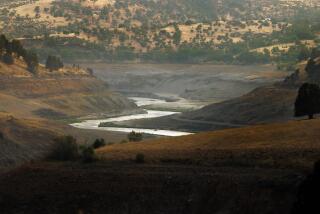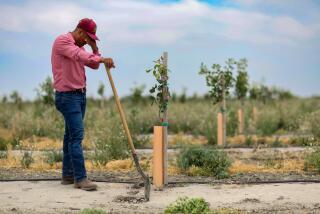Sapped by What They’d Sown
- Share via
MADISON, S.D. — Draining wetlands was as natural as planting corn for farmers Mark and Dan Johnson.
Growing up, they helped their father install drainage pipe for farmers around this town 125 miles north of Sioux Falls
In those days, the government helped pay to dry out farmland and put more of it into production.
By their reckoning, they have drained a couple of hundred wetlands for other farmers while running the family’s excavation business. But they learned a tough lesson when they decided to empty the slough covering half of their own 240-acre spread above Lake Herman State Park.
The farm they called their “little piece of America” became one of South Dakota’s biggest wetlands enforcement cases. Their elimination of an entire slough -- and the way they did it -- instantly put the Johnsons at odds with conservationists who already were protesting the destruction of tiny, shallow wetlands around the state.
The federal government’s eyes and ears on wetland issues here normally is the U.S. Department of Agriculture’s district conservationist. But he had told the Johnsons in 2000 that he had no jurisdiction. Unlike most farmers, they were not receiving any subsidies that made them subject to mandatory wetland protections.
The Johnsons next were told to check with the Army Corps of Engineers, which regulates the dredging and filling of wetlands under the Clean Water Act. But they didn’t do it.
The Supreme Court had ruled in 2001 that isolated wetlands -- those not linked to interstate, navigable waters -- were not subject to antipollution laws. And the Johnsons said they assumed their slough could be drained.
So, after getting county approval, the brothers dug a deep ditch on the eve of 2002 and began the draw-off.
But the water flowed downhill through a radio station’s property, onto a golf course and past the stone clubhouse belonging to the local chapter of the Izaak Walton League, a hunting and fishing group that works to protect wetlands that support geese, ducks and other game birds. Soon the conservation group was outraged -- and the Johnsons became the subject of newspaper headlines and a federal investigation.
The government alleged that the drainage from the brothers’ farm polluted waterways connected to major, navigable rivers, including the Missouri.
Under a settlement last year, the brothers agreed to pay $35,000 and to restore the wetland. They said the dispute cost more than $200,000 -- about twice what the farm cost several years ago.
“We feel like it’s not even America anymore, like you do not have control of your land,” said Mark Johnson. “It’s just a mess. Too much government.”
More to Read
Sign up for Essential California
The most important California stories and recommendations in your inbox every morning.
You may occasionally receive promotional content from the Los Angeles Times.










